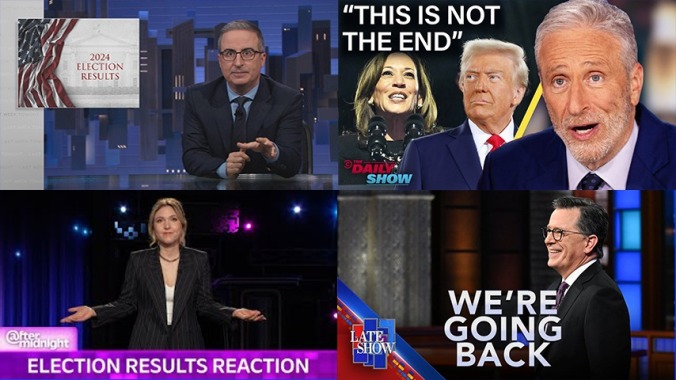Late Night Last Week: Jon Stewart and John Oliver Get Ready for the Road Ahead

Earlier this month, when Jon Stewart announced that he would continue to helm (on Mondays) The Daily Show into 2025, I began to get a pit in my stomach. I was thrilled, of course, but I couldn’t help but feel that perhaps the wizened man of satire had a certain feeling about the road ahead, that his decision to remain was less about the good vibes and ratings he brought to the program, and more so about feeling the need to stand firmly in the breach.
But one thing is certain, Grover Cleveland’s place in the pantheon of presidential trivia has been forever altered, as Donald Trump joins him as the second man elected to two nonconsecutive terms. “He was the leader of something called the Bourbon Democrats,” Stephen Colbert said of Cleveland in his first post-election monologue, on November 6. “And I’m guessing this morning, there were a lot of Bourbon Democrats,” he added, bringing a class of his own to his lips.
While most late night hosts took election night off, waiting until the following day to give their take on Trump’s return to power, there was Colbert’s pal Stewart, on Comedy Central, broadcasting live with the program’s cast of correspondents, making light of the dark cloud they saw approaching from the moment they went on air. “Now I know a lot of people out there are feeling anxious, and I want to assure you that that is very good for our ratings,” Stewart said on Tuesday evening. “So keep up the good work out there. Do not remove your eyes from the TV at all costs.”
It was true. For the next four years, despite all the very real threats to institutions and individuals that may, and most likely will come to pass, it will all be very good for the media companies who treat Trump like a circus. It is equally important not to treat Stewart, who has been with us for all of this millennium, as some kind of infallible savior who exists above this fray, but let’s be real: he is far better at his job than anything on network television, which, in the words of disgraced CBS executive Les Mooves, looks at Trump and sees ratings.
As he has for decades, Stewart, in the wake of the right’s triumph on Tuesday, took the long view, bringing in historical context and making clear just how full of shit most of the post-election takes will be. He played a montage of punditry, which began with George Stephanopoulos predicting in 2008 that we were about to enter a post-racial society. “Yeah, that lasted a day,” Stewart said.
He ended the evening with this: “But this isn’t the end. I promise you. This is not the end. And we have to regroup and we have to continue to fight and continue to work day in and day out to create the better society for our children, for this world, for this country, that we know is possible. And it’s possible.”
Colbert and Jimmy Kimmel took far different approaches than Stewart. Both returned to their studios on Wednesday, Nov. 6, with a somber tone, emphasizing that it was a privilege to be able to get up and broadcast for their audience. Like many talk show hosts and pundits, Colbert and Kimmel seemed a bit lost, unsure how to console an audience with hope after spending months warning about the dangers of a second Trump term. “And it was a terrible night for everyone who voted against him, and guess what,” Kimmel said. “It was a bad night for everyone who voted for him too. You just don’t realize it yet.”
Both hosts presented their usual mix of milquetoast jokes, ones that just regurgitate some silly headlines, told in an eye-roll kind of way. For example, the two hosts made nearly identical jokes about search results in the wake of the election. There was apparently a spike in users asking when and why Joe Biden dropped out of the race—both hosts said it was Biden himself searching this in the White House.
To watch Colbert and Kimmel in the immediate wake of the election was to see a style of comedy that has proven itself to be woefully ill-equipped to deal with what is ahead. Stewart’s style of opposition comedy is rooted in smart, research-based critique that, in turn, takes on the entire media ecosystem. Colbert and Kimmel are very much a part of that system, which allows opposition comedy in a style that feels more like a lecture on right and wrong than a systemic critique. As Donald Trump enters the presidency with a larger, more energized coalition, the approach feels eerily, unhelpfully siloed.
-

-

-

-

-

-

-

-

-

-

-

-

-

-

-

-

-

-

-

-

-

-

-

-

-

-

-

-

-

-

-

-

-

-

-

-

-

-

-

-








































